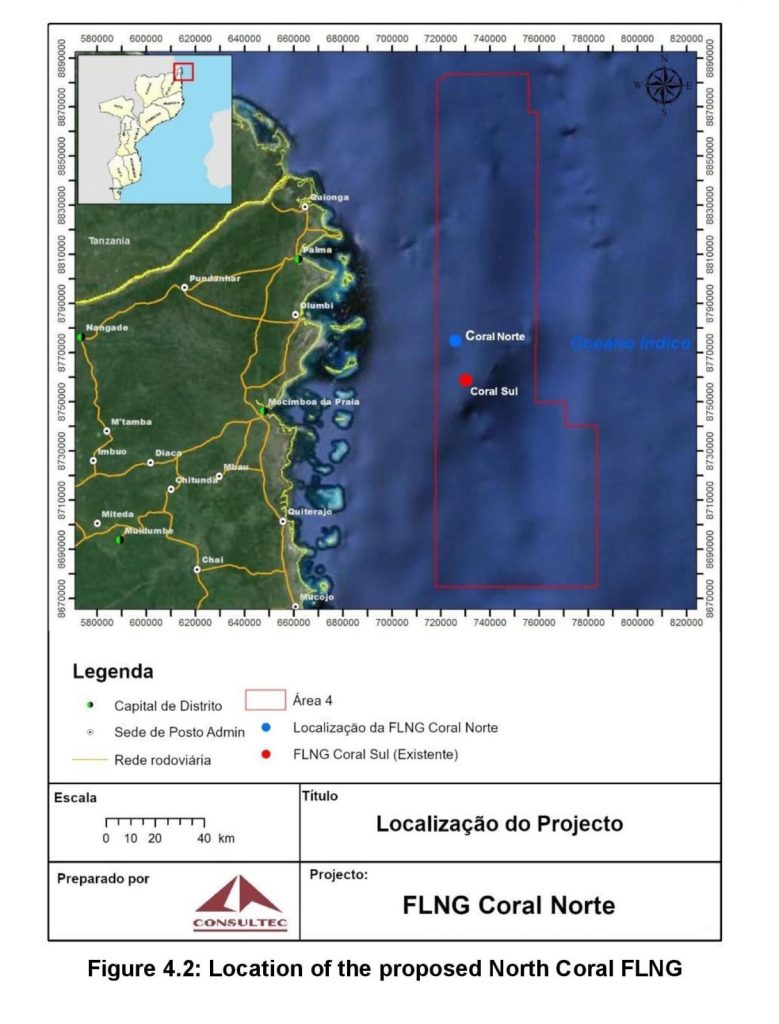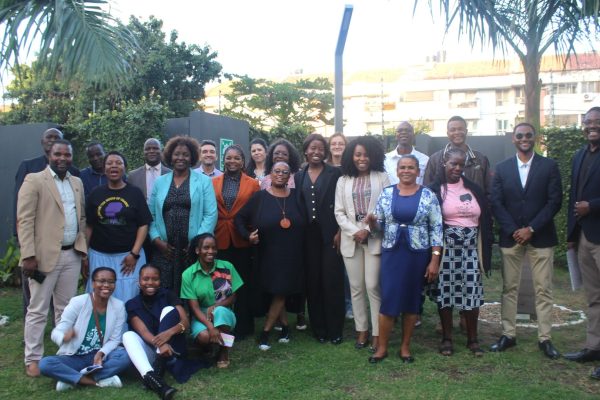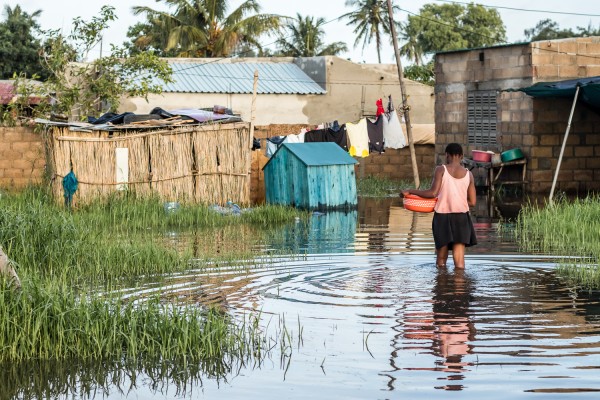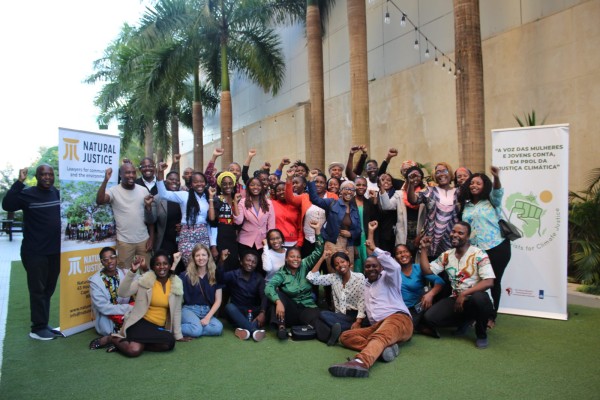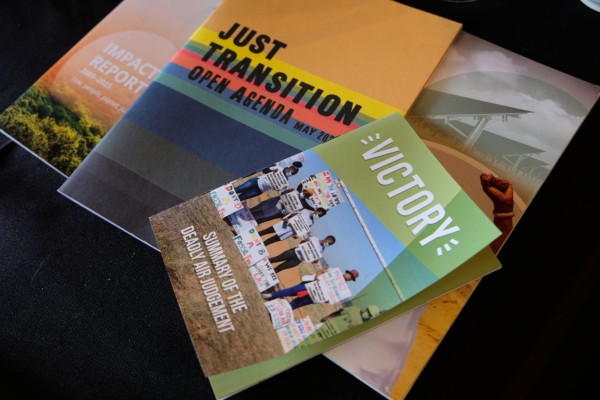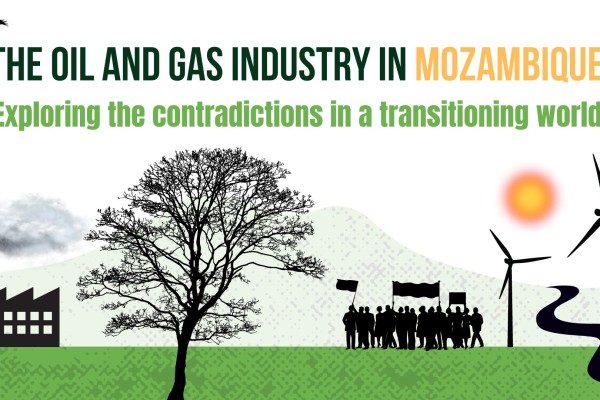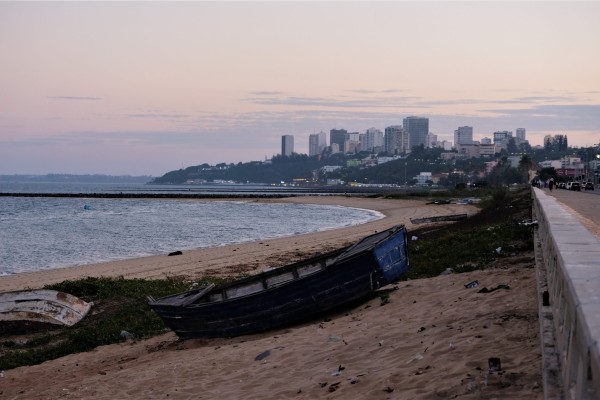In May 2024, Justiça Ambiental and Natural Justice submitted comments on the Environmental Impact Assessment (EIA) report for the proposed Floating Liquefied Natural Gas (FLNG) unit, “Coral North”, in the Rovuma Basin in the province of Cabo Delgado, Mozambique.
The Coral North project, to be developed by a consortium led by Italian company, ENI, entails the development of six (6) subsea wells to extract natural gas from Mozambique’s offshore Coral reservoir. The gas will be treated, liquified, stored and offloaded, for export, from the FLNG unit, which will be anchored at sea approximately 50 km from the coastline. The production capacity of the unit is 3.55 MPTA (million tons per year) of gas. This project is intended to be a replica of the existing Coral South floating LNG project, also run by ENI, which has been operational since 2022. The Coral North and Coral South units would be 10 km apart.
Comments on the EIA show that this project is not sustainable and that there will be unacceptable harmful impacts should it proceed. The comments to the EIA advise that the Coral North project, and its EIA, are not in compliance with national and international legal instruments, including Mozambique’s Constitution, its Environmental Act (20/97) and EIA Regulations. Therefore, the authorisation and licensing of this project should be refused. These comments are supported by independent expert reports on the impacts of the project.
Currently, the project is being developed by Mozambique Rovuma Basin, whose three main shareholders are ENI Rovuma Basin, ExxonMobil and China National Petroleum Corporation. A Preliminary Environmental Impact Assessment was undertaken which comprises a technical and scientific analysis of the environmental and social consequences of the project’s implementation. This EIA report will form the basis for decision-making on this project. This will be sent to the Multi-sectoral Technical Commission for EIAs for consideration and review, after which, it will be sent to the Department of Environment for a final decision and issuing, or refusal, of the License. This EIA will not be sent to independent peers for review. The organisations, however, say that the project is one which is required, by regulation, to be subjected to this review.
Key objections
Some of the key objections to the project’s EIA, as raised in the comments, are the following:
Public participation during the EIA process was inadequate and several essential documents that were needed in order to comment on the EIA were not made available. These include various specialist studies for the Coral North project and monitoring reports for the Coral South project, that are referred to and relied upon in the EIA (but not made available to interested parties, despite requests).
The EIA does not adequately assess the project’s impacts on marine species and ecosystems, as it leaves out a number of critical assessments of, for example, the cumulative acoustic impacts of the project on marine species that are crucial for sustaining livelihoods and marine biodiversity. These comments are supported by an independent expert report on the acoustic and marine impacts of the project.
The EIA does not adequately assess the risks and impacts of oil spills, as the oil spill modeling relied on was simplistic and inappropriate for evaluating the potential severe impacts of a well blowout. These comments are supported by an independent expert report which critiqued the oil spill modeling for the project.
The EIA does not adequately assess the project’s impacts on climate change or the risks of climate change to the project and the surrounding area, which is critical as Mozambique is highly vulnerable to the impacts and high costs of climate change. Importantly, the project also risks jeopardizing coastal communities’ ability to adapt to the impacts of the climate crisis as these intensify – these impacts were not assessed in the EIA. The channel that the project will be based in plays a critical role in regional climate resilience as a site of climate change refuge.
Mozambique has a constitutional obligation to protect its people from harmful climate change impacts, which are already significantly impacting communities. To reduce the risks of harmful climate impacts, the science is clear that there can be no further LNG development to keep warming below 1.5 degree Celsius, a temperature that will be devastating for Mozambique. The EIA significantly understated and erred in its assessment of the project’s anticipated greenhouse gas emissions. The EIA failed to account for downstream scope 3 GHG emissions – being emissions that would be generated further down the project’s value chain, i.e. from the use of the LNG to be produced.
The EIA does not adequately assess the socio-economic impacts of the project. It makes a number of speculative claims about the socio-economic benefits that the project would bring to the people of Mozambique without providing any supporting evidence for these claims. It fails to account for the fact that, to date, LNG development in Mozambique has yielded little in the way of social and economic benefits for the people of Mozambique. In Cabo Delgado, where this project would be developed, it has been the opposite, as circumstances for people on the ground have worsened since the start of exploitation of gas in the region.
According to the International Institute for Sustainable Development (IISD), LNG projects in Mozambique have increased the national oil company’s debt and sovereign liability. LNG agreements are structured in such a way that the majority of revenues for Mozambique will occur in the mid-2030s and 2040s and are subject to developments in the international LNG market, transferring the risk to the State. Gas extraction consortiums also avoid paying taxes on dividends or interest. Mozambique, as a country, has very limited participation in the value chain, so while foreign companies make money at every stage, Mozambique does not. The EIA also fails to account for the high risks that this project poses to Mozambique’s economy as the world transitions away from fossil fuels and export markets are unlikely to yield the projected benefits over the project’s anticipated lifespan.
The EIA does not adequately assess the impacts of the project on the health of women and vulnerable groups in the affected communities, which is required by Mozambique’s EIA Regulations. The project also has important implications for human rights and the ongoing conflict and insecurity in Cabo Delgado. The fact that the project is located in Cabo Delgado, which is currently a conflict-zone, is important. The conflict has led to over a thousand deaths and has contributed to a humanitarian disaster, with local communities displaced, killed, traumatised and facing severe hunger.
The fact that the primary components of the project would be based offshore is irrelevant. For companies operating in conflict-affected contexts, the United Nations Guiding Principles on Business and Human Rights (UNGP) state that, as the risk of serious human rights violations is greater in conflict-affected areas, companies should undertake a more complex human rights due diligence process. The EIA did not conduct the due diligence required for developing a project in a conflict zone.
The EIA does not adequately assess cumulative impacts – these being the impacts of Coral North combined with the operations and risks posed by the existing Coral South project, as well as other proposed and upcoming gas developments in the region.
Lastly, the EIA does not adequately evaluate alternatives to the activity, including the alternative of not moving forward with the project – what this could mean in terms of reduced risks to communities, the protection of their human rights and the environment.
In conclusion, the comments submitted by Justiça Ambiental and Natural Justice indicate that the EIA report is flawed, and does not comply with the legal requirements. For these reasons alone, the project should not be approved by the Department of Environment. It is clear that the project will also lead to significant damages and that the project risks outweigh the benefits.
“It is really concerning to see how many deficits there are in the Environmental Impact Assessment report for Coral North. It was very frustrating not to have received important documents related to the EIA, despite a formal request for them. It was also disheartening to see how few people were consulted. A thorough analysis of the impacts of a project like this is crucial for the human rights and livelihoods of the people the project will affect. And this involves not just a consideration of the short-term impacts, but must delve into the political and economic narratives of gas globally. Gas is becoming a riskier pathway for every country, but it seems even more shortsighted in a country like Mozambique where the experience of climate change events is frequent and devastating.”
Custodio Duma, Natural Justice
